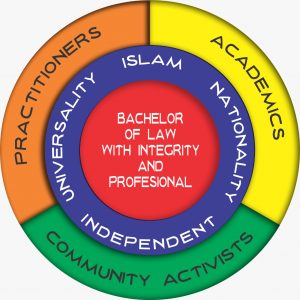Alumni Profile of the Undergraduate Study of the Faculty of Law UII

Alumni Profile of the Undergraduate Study Program In Law
As a derivative of the Vision, Mission, and Objectives of the Undergraduate Study Program of the Faculty of Law of UII is formulated by the profile of graduates depicted in 3 (three) circular circles. The selection of the form of 3 (three) layers of the circle is intended to mean that the innermost layer as the core profile of the graduate. The shape of the circle is intended as a symbol that has a philosophical value, meaning that graduates that have good quality, reliable, dynamic, and flexible (see picture).
The profile of graduates in the form of 3 (three) circles has the meaning contained in each layer as follows:
-
The deepest layer is the core layer that reflects the commitment of the Bachelor Program of the Faculty of Law of the Islamic University of Indonesia to produce a Bachelor of Law with integrity and professionals. The detailed meaning of this layer is: (a) the meaning of “integrity” is to have quality, character, or condition that shows a complete unity so that it has the potential and ability that exudes authority and honesty; (b) the meaning of “professional” is to have intelligence and special skills to carry out the profession; and (c) This red color as the inner layer background is intended as a symbol of the strength and courage of graduates in upholding truth and justice.
-
The middle layer is the values that inspire graduates of the Undergraduate Degree program. The explanation for these values is as follows. (a) Islam. Islam is the core value of attitudes that graduates must possess as follows: devotion to God Almighty and be able to show religious attitudes, upholding human values in carrying out tasks based on religion, morals, and ethics, internalizing academic values, norms and ethics, able to become Muslim intellectuals and leaders who are devoted, noble, knowledgeable and scientific, and perform Islamic da’wah in order to spread Law in particular and Islamic science in general. (b) Nationality. Nationality is the core value of attitudes that graduates must possess as follows: contribute to improving the quality of life in the community, nation, state and progress of civilization based on Pancasila, acting as citizens who are proud and love the country, have nationalism and a sense of responsibility in the country and nation, respect the diversity of cultures, views, religions, and beliefs, as well as the opinions or original findings of others, work together and have social sensitivity and concern for society and the environment, and obey the law and discipline in the life of society and the state. (c) Independent. Independent is the core value of attitudes that graduates must possess as follows: show an attitude of responsibility for work in his area of expertise independently, and internalizing the spirit of independence, struggle and entrepreneurship. (d) Universal / Universal. Unversal / Universality is the core value of attitudes that graduates must possess as follows: have universal values in the fields of science, leadership, expertise, independence, and professionalism; and able to compete with other university level graduates who are of high quality in developed countries.
-
The outermost layer is the intended role of graduates of the Law Study Program at the UII Faculty of Law. The roles are as follows. (a) Practitioner. Practitioners are people who have expertise in certain fields and act as judges, prosecutors, advocates / legal consultants, notaries, or legal officers. The orange color as a practitioner’s background color is a symbol of success, mind health, fairness, endurance, fast motion, independence, warmth, energy, young spirit, and interest. (b) Academics. Academics are people who have expertise in certain fields and play a role in the fields of education and research. Yellow as an academic background color is a symbol of hope, besides that as a symbol of education. That is, the Undergraduate Study Program at Faculty of Law UII will produce hopeful scholars of the nation who will continue and continue to disseminate knowledge through Islamic education. (c) Community activists. Community activists are people who work or act actively for religious, social, cultural and / or rights of the general public. Community activists are the expected role as the implementation of Da’wah Islamiyah or Islamic teaching.





